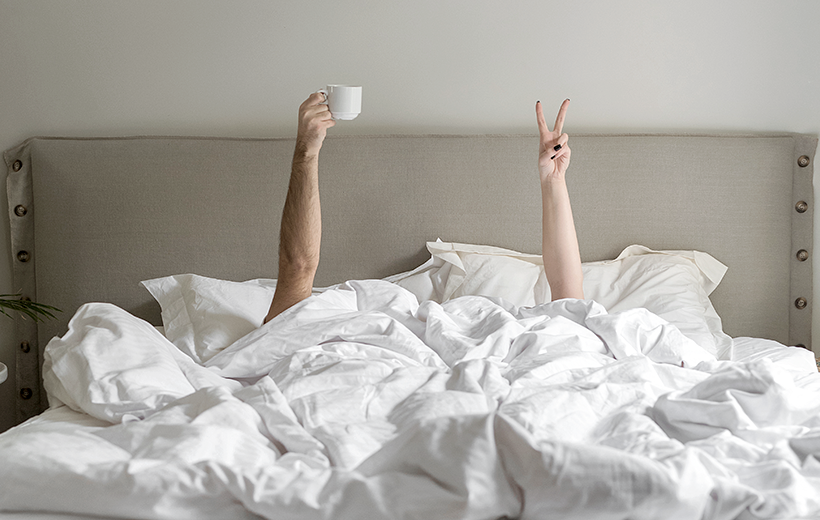In this special time of the pandemic, ensuring a good night's sleep is more necessary than ever. But how;
Sleep covers a third of your life and is crucial for your mental, intellectual and physical health. Adequate and quality sleep - which gives you a feeling of rest and rejuvenation - is related to brain functions, reduced stress levels, proper functioning of the immune system, etc. Conversely, lack of sleep causes damage, even when we refer to a transient and short-term lack.
In our time we are experiencing a serious epidemic of lack of sleep, long before the Covid-19 pandemic. Did you know that according to Oxford researchers today we sleep 1-2 hours less than 60 years ago? And not without reason, since the reduction of daily sleep is due to the frenetic rhythms of the modern lifestyle.
With the Covid-19 pandemic, although these rhythms have been externally limited, sleep is one of the first things to be negatively affected, as it is directly related to stress. Social isolation, restrictions, daily stress, and financial and professional insecurity create conditions where pressure prevails, causing – among other things – sleep disorders.
To manage the prevailing climate of uncertainty and collective anxiety, we suggest some small and simple changes in your lifestyle to take back control of what you can, indeed, control. And so, it is these small shifts in everyday life that will bring a domino of... positive developments in your health.
What can you do practically to have quality sleep?
1. Find time in the day for conscious relaxation
The quality of your sleep depends on how you manage your day. If the tension of the whole day has exceeded your personal limits, it is difficult to simply flip the "switch" when it is time to relax and sleep.
So make sure you consciously take relaxation breaks throughout the day. In this way, you will get in touch with yourself and be able to realize when you are pushing yourself more than you should.
Ideas:
Practice conscious breathing. You usually breathe without realizing it. If you bring your attention to the breath, you will see immediate results as the mechanisms of the parasympathetic system are activated.
Do relaxation exercises (such as Jacobson's progressive neuromuscular relaxation) or meditation.
How often do you get so involved in something you love that you feel like time is flying by? Then you are in a "flow" state. You feel it when preparing a daily meal, gardening, or reading a book. Notice what those habits are and establish them. Attention: communicate to your loved ones that you need some time alone and do not use devices such as mobile, tablet, or computer in these activities.
2. Get in tune with your body clock
Your biological clock, which determines all of your body's circadian rhythms, is regulated by external changes in light. While you avoid exposure to morning light (especially during lockdown periods), you end up overexposing yourself to artificial light. In this way, your biological clock is strained.
Respecting the biological clock, gentle physical exercise, and doing something you love activates the brain's reward system, i.e. your body's natural anti-stress system.
Ideas:
Spend 20 minutes every day outside in natural light, especially in the morning. Combine your exposure to light with walking or gentle exercise in nature.
Set up your bedroom so it's completely dark before bed. Darkness stimulates the production of melatonin, the sleep hormone, and sends a message to the body that it's time to rest.
Move the TV or other electronic devices away from the bedroom.
Turn off all electronic devices 90 minutes before going to bed.
3. Acknowledge and express your feelings
In the relaxation pauses in the day, turn your attention for a while to what you feel, without judging whether it is right or wrong. Acknowledging emotions, whether positive or negative, is the first step to acceptance.
Talk to your loved ones about your feelings, taking responsibility for how you feel. If you are alone, express yourself in a creative way, such as by singing or writing. The emotions you try to avoid usually come back stronger, especially during relaxation and sleep.
4. Create a daily sleep routine before you go to bed
Especially in these days when the boundaries between the personal and the working space and time have become confused (teleworking, distance learning, etc.), it is necessary to delimit the hours of work and rest yourself. By being available 24/7, you're just undermining your health.
Ideas:
Maintain a consistent bedtime and wake-up time, even on weekends, while remaining flexible to accommodate exceptions.
Avoid having serious, emotionally charged conversations before bed.
Avoid consuming excessive food or fluids, caffeine, nicotine, or alcohol.
Do some gentle exercise (stretching), meditation, and a bath to relax.
5. Manage insomnia when it occurs
Worrying about whether you'll be able to sleep can be more damaging than the lack of sleep itself. When thoughts start swirling in your mind, just before sleep, it often means that you have not paid attention to them during the day.
Common bedtime worries are about what to do the next day, what the future holds, or what happened in the past, and worrying about not being able to sleep.
Ideas:
Make a list of the important things you have to do the next day.
Keep a gratitude journal to cultivate an appreciation for what you already have.
If it's been 20 minutes since you've been in bed and you can't fall asleep, it's best to get up and write down your thoughts, or engage in a gentle relaxing activity, until you fall asleep.
Despite small lifestyle changes, do you still struggle to enjoy a really good night's sleep? Contact a specialist, who will help you manage the difficulties and regain the right to rest and sleep!
Georgia Hatzinikolaou
